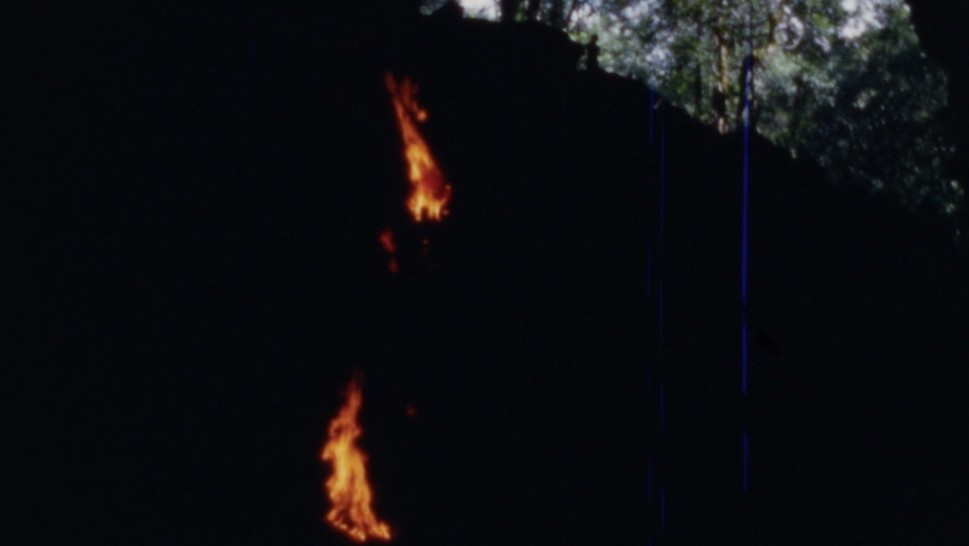
Expedition Content
US, 2020, DCP, color and b&w, 78 min.
English and Hubula with English subtitles.
DCP source: Cinema Guild
Well known to Harvard Film Archive audiences as a guest performer, sound composer/designer on numerous films, and former mainstay of the Film Study Center, Ernst Karel (b.1970) is most closely associated with that department’s Sensory Ethnography Lab for his cinematic sound work as well as his course in “sonic ethnography.” For his most recent adventure, he collaborated with another SEL affiliate, Veronika Kusumaryati (b.1980), a political and media anthropologist focused on West Papua. She received her Ph.D. in anthropology with a secondary field in film and visual studies from Harvard and is currently a postdoctoral fellow at Georgetown University.
Four years in the making, Expedition Content is an exploration in “decolonizing the archive” through deep listening. The nearly imageless film is constructed from recordings made in 1961 in West Papua by Michael Rockefeller, heir to the legendary Standard Oil family who had been involved in early oil exploration in New Guinea. Rockefeller made the recordings as part of an expedition organized by another figure familiar to HFA frequenters: filmmaker, professor and HFA co-founder Robert Gardner. Understanding the complex power of cinema, Gardner was instrumental in developing and nurturing film studies and film production at Harvard. Many of his films would enter the ethnographic canon, though he strived to set himself apart from that rigid categorization by taking a distinctly poetic, philosophical approach.
Without dismissing the endeavors of their forebears, Karel and Kusumaryati open up the cinematic and ethnographic space to allow for more points of view, for questions and reconsiderations. The film brings sounds, unheard for decades, out into the open and now into the Papuan archives as well. While West Papua remains occupied by Indonesia, Rockefeller’s formerly hidden audio archive also represents a vital preservation of much of the Hubula language and traditional songs which have been lost to current generations through years of colonial rule, exploitation and globalization.
While director of the Film Study Center, Robert Gardner led a “Harvard Peabody Expedition to Netherlands New Guinea” in 1961 to comprehensively study the Hubula (also known as the Dani) of the Baliem Valley. Largely financed by Harvard and the Dutch colonial government, the trip produced an influential assortment of books, photographs and dissertations, as well as Robert Gardner’s classic ethnographic film Dead Birds (1964), all of which had a profound effect on anthropology and even helped shape the United States’ relationship with New Guinea. Among the erudite all-male team of anthropologists and artists was a twenty-three-year-old Michael Rockefeller—now most famous for his disappearance three months later—who took photographs and recorded thirty-seven hours of audio. The images were later compiled into a book New Guinea Photographs, 1961, published in 2006, and the audio archive was recently released when his family donated the tapes to Harvard’s Peabody Museum of Archaeology and Ethnology.
Accessing the largely unheard and unedited audio collection allowed Karel and Kusumaryati to remove the durable, yet cracking frame, one which has so long informed Westerners’ perception of the Hubula and indigenous tribal cultures in general. And with this unframing, the image itself almost entirely disappears—unmooring the film from the “imperialism” of the image and the gaze, which Karel and Kusumaryati ultimately reveal to be disturbingly prejudiced, despite the expedition’s apparently objective and humanistic intentions.
Literally left in the dark, the audience is free to explore and discover on their own the sounds of the Hubula in day-to-day domestic activities, the rhythms of the natural world in sync with breathtaking rounds of communal singing and other vocalizations, and their complicated interactions with the curious foreigners. What is silent or unseen in Dead Birds—which focuses almost solely on the men and the warfare—is finally released; women and children laugh, sing and comment. This unearthing also churns up candid, disturbing fragments of the contents of the frame itself—including the sounds of the crew’s debauchery one evening—again taking what was unseen or unspoken and letting it rise to the surface, without comment, for critical reassessment. Karel and Kusumaryati skillfully braid their careful selection of recordings into an engulfing, complex journey back in time, to a place few have experienced even vicariously. They revitalize a compromised space with rich content that has lain dormant for all these years, just waiting to be heard. – BG
These screenings are accompanied by a conversation between Ernst Karel, Veronika Kusumaryati, Papuan artist/musician Korneles Siep and HFA Director Haden Guest available online.
"Expedition Content and the Harvard Peabody Expedition to Netherlands New Guinea, 1961" by Ernst Karel and Veronika Kusumaryati in MAST: The Journal of Media Art Study and Theory, Vol. 2, No. 2, 2021








